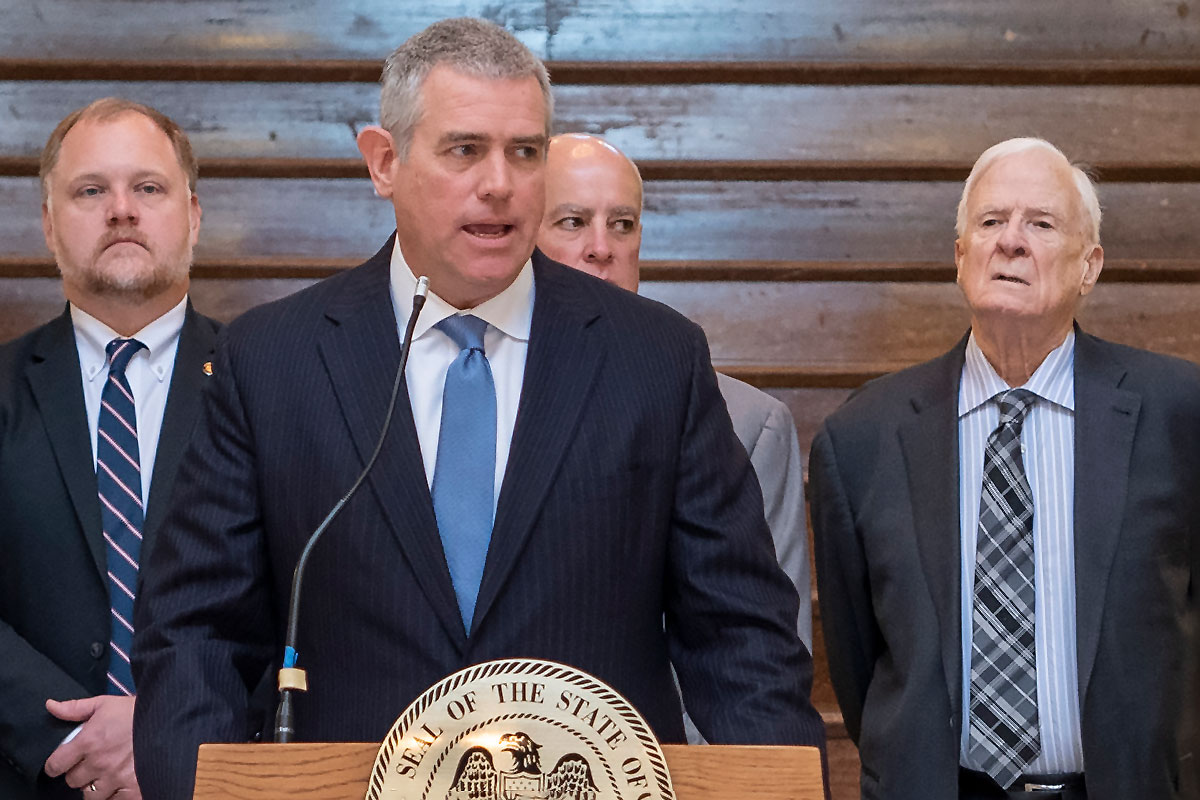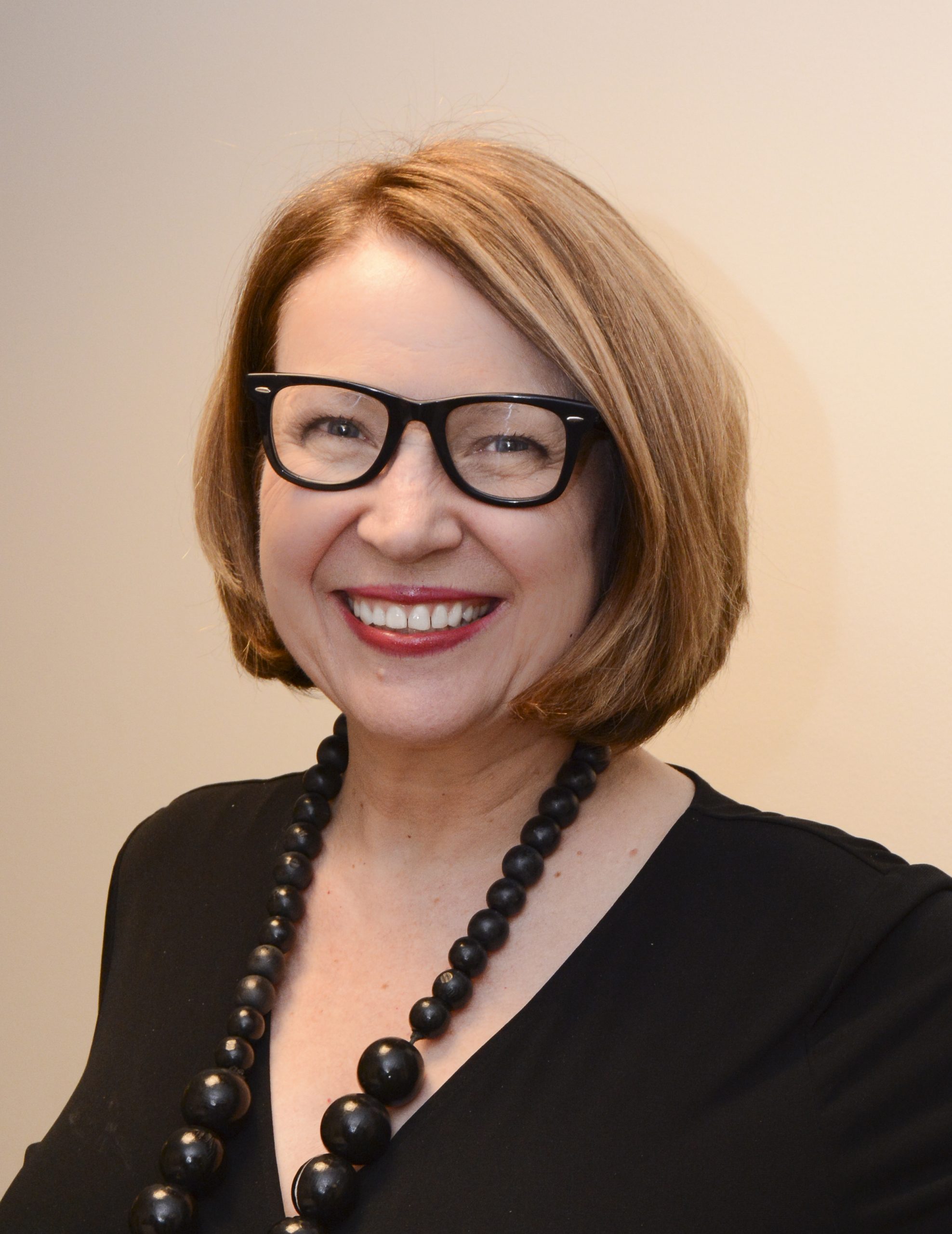The last couple weeks have felt like the busiest and most emotional month, at least, that I’ve lived through in a long time, and I know I’m not alone. It’s been one prolonged news cycle starting June 24 with the overturn of Roe v. Wade and really reached a crescendo last week when the world learned that Mississippi House Speaker Philip Gunn made it clear that he believes a 12-year-old girl raped and impregnated by her father or uncle cannot terminate a resulting pregnancy.
You likely know by now that the three U.S. Supreme Court justices who dissented in the Dobbs case cited and quoted Ashton Pittman’s 2019 Jackson Free Press article on Mississippi’s anti-abortion strategy on page 205 of what may well be the most historic dissent of our time. And hopefully you saw Ashton’s three-part series from January about the forces outside Mississippi who drafted and strategized the Dobbs case into reality. National media beyond Mississippi are now reporting on that history, too, although the known fact that anyone other than state legislators might have authored the legislation has gotten little if any traction with in-state media other than our team.
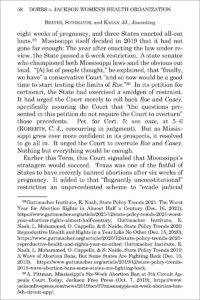
The biggest abortion-related story out of Mississippi last week was, of course, Gunn’s position that incest does not provide an exception to abortion laws, including for a 12-year-old girl raped by a man in her family. At a June 24 press conference about the Dobbs decision, two Mississippi reporters, Taylor Vance of the Daily Journal and Emily Wagster Pettus of the Associated Press, tag-teamed Speaker Gunn on the “incest exception” in a way that forced him to share his position.
This is how journalists should question all politicians and public servants daily including on specific forms of contraceptives and “exceptions” to the abortion bans. That is especially urgent considering that founders and leaders of Alliance Defending Freedom, the Arizona-based legal group that has claimed credit for writing Mississippi’s template legislation that ultimately overturned Roe v. Wade, are on the record describing methods and “devices” that physicians consider “contraceptives” as a form of abortion.
In fact, Alan Sears, a founder of Alliance Defending Freedom (previously called the Alliance Defense Fund), lambasted the Obama administration’s positions on contraception past fertilization in 2012 for National Review: “[A] few days ago, she declared that even where a ‘contraceptive’ device kills a human embryo before implantation, it doesn’t count as ‘abortion’ under conscience laws,” he wrote about then-Health and Human Services secretary Kathleen Sebelius.
The Southern Poverty Law Center classifies ADF as a hate group based on prolonged opposition to LGBTQ+ rights, including to marry, inside and outside the United States. But ADF denies the hate label and says its work is to protect the “religious freedom” of people (at least hose opposed to what ADF opposes). In this vein, former Judge Charles Pickering of Mississippi referred to his 12-year stint as an ADF board member in his bio for the upcoming Mississippi Book Festival, saying the group’s work “promotes religious liberty,” even as ADF tends to fixate on beliefs of select Christians in its efforts.
Critics point out that ADF’s Blackstone Legal Fellowship website said this back in 2014: “Alliance Defending Freedom seeks to recover the robust Christendomic theology of the 3rd, 4th, and 5th centuries. This is catholic, universal orthodoxy and it is desperately crucial for cultural renewal. Christians must strive to build glorious cultural cathedrals, rather than shanty tin sheds.”
Put simply, whether or not Mississippians are for or against calling contraception like IUDs and Plan B “abortion”—which many rejected in the 2011 referendum here to defeat Personhood—they do have the right to know exactly how state leaders, politicians and out-of-state influencers define what most people think of contraception. The public also has the right to know what exceptions they believe should allow legal abortions, whether a child impregnated by incest or a woman by other kinds of rape or protecting the life of a mother, and not find out these things after regulations and constitutional reversals come to pass.
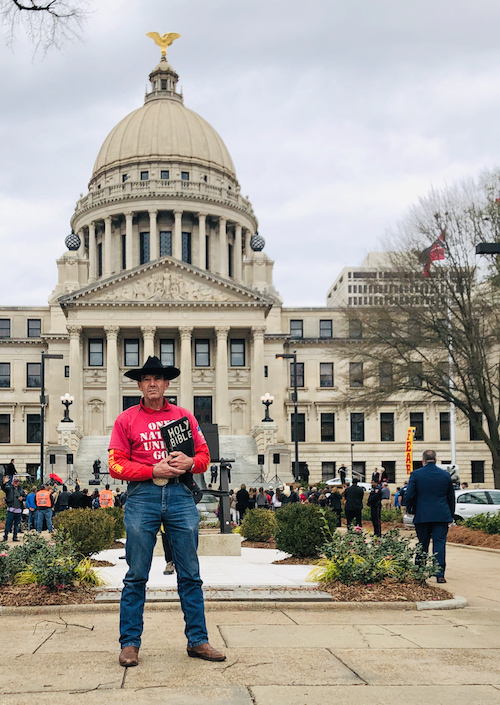
Thus, questions like Vance and Pettus asked demanding specifics of Gunn are vital, for members of whatever political party and on whatever level, not just the House speaker who gets to greenlight legislation for it to move forward and who chooses not to open up his House caucus meetings.
Where Were the ‘Breaking’ Stories?
But here’s the journalistic rub in the Philip Gunn revelations: Tenacious reporters got the speaker squarely on the record the afternoon of June 24, 2022. But, somehow in a state where media value “breaking” a story to a fault sometimes, no real stories then centered Gunn’s incest position. The remarks were buried in longer pieces in outlets that bothered, with some headlines instead quoting Gunn’s remark that Roe’s overturn was “an end to this evil” of a practice that was legal until that day. Thus, Gunn’s huge-news remarks went nowhere other than some tweets, and few folks were the wiser.
This isn’t a huge surprise for two reasons, and it’s not necessarily about poor news judgment by the reporter or sometimes not even the editor, depending on how much authority they actually have. First, various Mississippi reporters have long complained quietly to me and my reporters that their leaders don’t allow them to center or even often report news that really challenges the powerful, including sacred institutions. A good example is our award-winning UM email series, which leaders at multiple outlets refused to touch even as they had the emails, too, with some reporters around the state wanting to report them.
Second, this de-centering of urgent news is indicative of how many journalists in a male-dominated industry have long relegated coverage of issues about women’s health and safety to the bottom, buried under ubiquitous political partisanship gamer obsessions or juicy rhetorical quotes.
Old Political, and Media, Habits Die Hard
This isn’t new, dating back to the state’s 2007 Democratic-majority House (and Senate until two Dems jumped aisles, shifting the majority) passing abortion trigger laws, which did not allow a specific abortion exception for incest, either, although it excepted rape. (Dems also put forth a strong anti-Roe bill in 2006 in Mississippi.) The de-centering by politicians and media then and now of “women’s issues” is systemic and often implicit, but it is a very real problem.
In fact, a lot emerged about these kinds of harmful media decisions in the coverage of Harvey Weinstein’s sex crimes, especially in Ronan Farrow’s excellent book on media coverups of sexual predation. Read it to understand more about how unchecked power deflects and enables abuse inside news operations and by friends of newsroom leaders and executives. (I wrote about some of the Farrow book’s revelations here.)
You likely know by now that the Mississippi Free Press rejects both of those approaches. After we watched that huge Gunn news dying on the vine last week, Ashton texted me that he was doing a story about the speaker’s incest remarks. In his contextual Gunn piece, Ashton, of course, fully credited the reporters who asked the questions, and by name, as he wrote the overdue story that provided no cover or sugarcoating and that didn’t “bury the lede,” as we call it in the trade. Ashton’s story blew up nationally, as the remarks should have the day Gunn said them. People, whether they agree with the speaker’s sentiments or not, have the right to know public servants’ specific positions. They need context, and they need the truth—especially the kind those pols don’t want reporters to present in full.
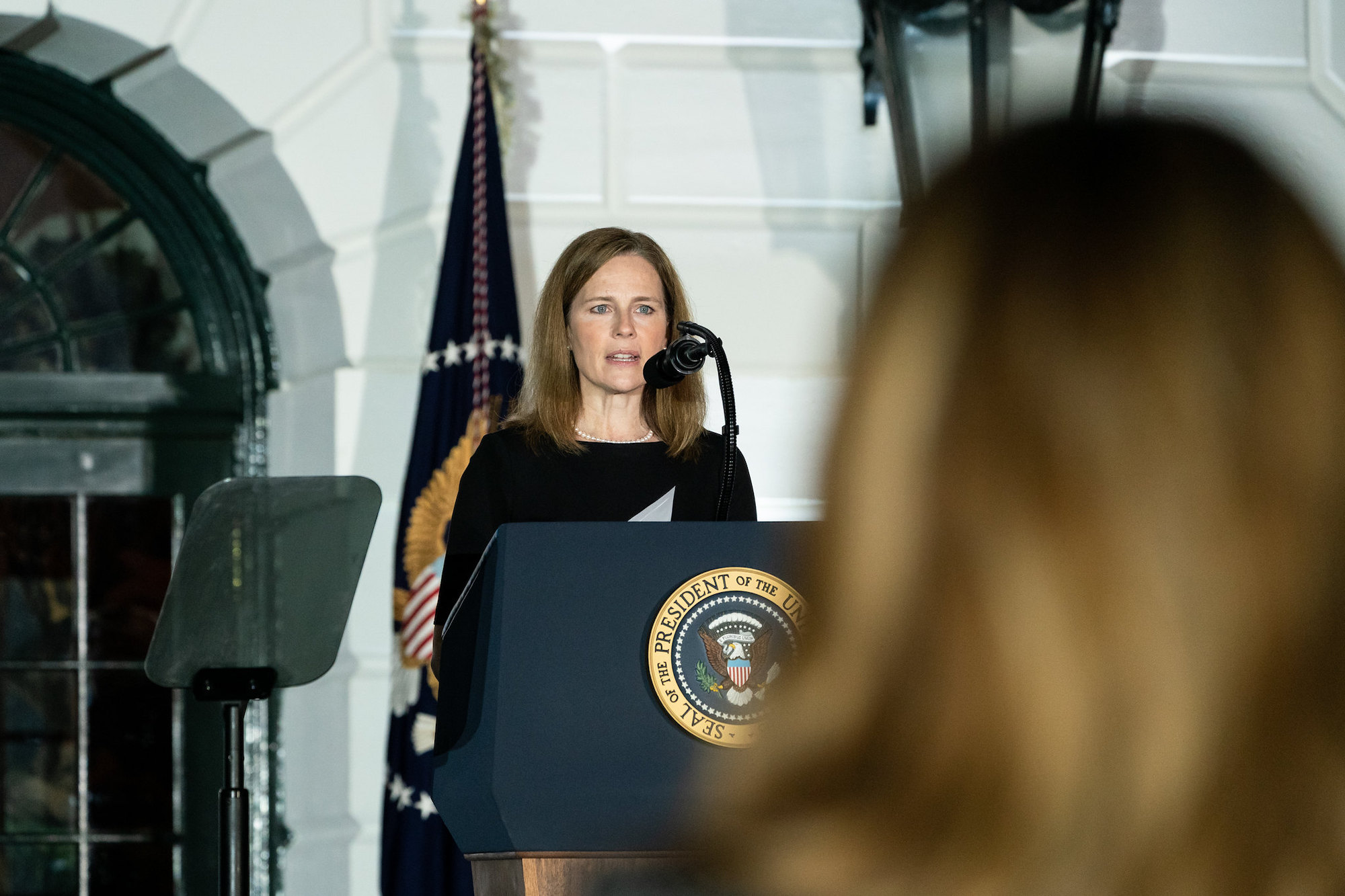
This is one way the Mississippi Free Press is unique (sadly). We don’t dance around or bury essential news that has a direct impact on Mississippians’ lives, especially that of women and those perpetually under-represented in stories and bylines. We also amplify other good reporting even when their own outlets won’t, and we name names of those doing the good work. We openly challenge the news ecosystem to do better in Mississippi, because this work is so much bigger than individual egos.
We are living in terrifying times here in the 21st century for so many people who don’t enjoy the level of privilege that most media decision-makers do, including children and rape and incest victims.
Again, whether or not Mississippians wish to return to the legal doctrine of the 3rd century A.D. or not, we all deserve the truth, and we as journalists can only change systems of select knowledge by naming them.
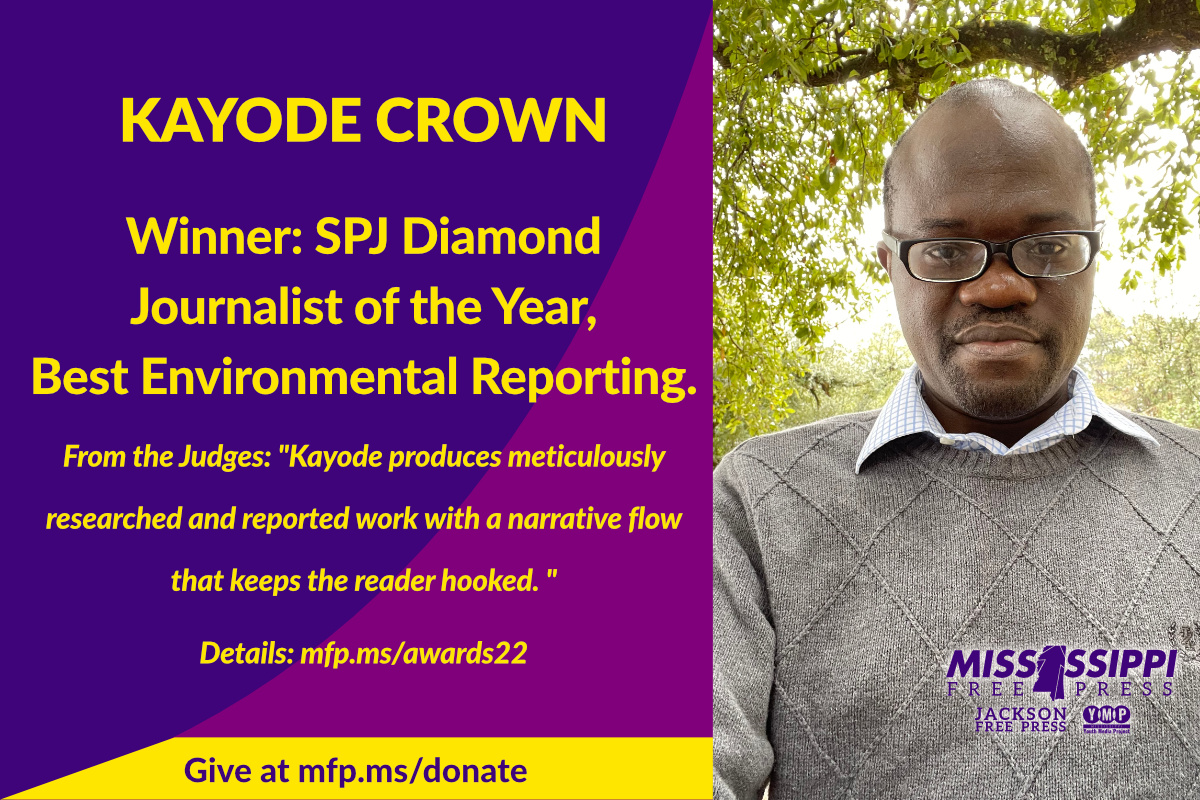
Speaking of reporting the whole truth, a huge shout-out goes to Kayode Crown, the Diamond Journalist of the Year, just announced by the Society of Professional Journalists Diamond Awards in Little Rock, Ark., spanning seven southern states. And get this: Our team won—wait for it—eight first-place awards, this year competing against outlets and dailies of all sizes. Fifteen of our team members took 16 honors total; take a look at the awards and these mostly native Mississippians who represent so many different communities in our state. They bring excellence, caring, and mutual cooperation and care to this work daily. I’m so proud of them.
Plus, today we’re announcing that reporter Nick Judin is a 2022 National Fellow of the Center for Health Journalism to report on evictions and health equity. They’re flying us both out next week to get ready to work on this fellowship along with the 25 other fellows from national and local outlets. Congratulations to Nick! We appreciate his excellence and devotion to systemic reporting in his home state.
Finally, putting on my CEO hat, a huge thanks to all of you for helping our nonprofit raise over $250,000 since April 1 to both support and grow this team and, thus, our ever-more-impactful journalism. Bottom line: You make this happen. If you haven’t, please give now if you can. Your support is how our urgent work perpetually creates a national conversation as we did once again last week around the House speaker’s remarks.
This MFP Voices essay does not necessarily represent the views of the Mississippi Free Press, its staff or board members. To submit an essay for the MFP Voices section, send up to 1,200 words and factcheck information to azia@mississippifreepress.org. We welcome a wide variety of viewpoints

